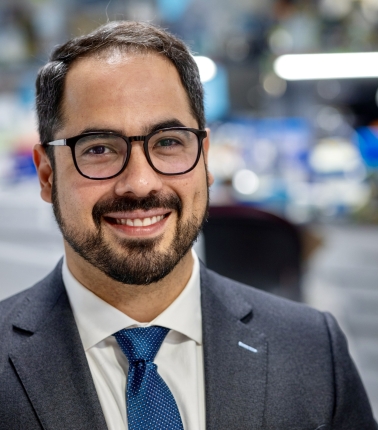
Departmental Affiliations
Radamés J.B. Cordero, PhD, investigates how fungi regulate temperature and thrive in extreme environments.
Research Interests
astromycology; fungal pigments; polysaccharide capsule; Cryptococcus; radioprotection; energy budgets; thermal biology; infrared imaging; color-mediated thermoregulation; thermography; infrared camera; heat dissipation; solar radiation shielding; energy storage; photovoltaics; scholarly communication practices; fungal hypothermia; yeast; mushroom; molds; space radiation
Additional Links
Experiences & Accomplishments
Dr. Cordero is an academic entrepreneur dedicated to addressing pressing global challenges through science, education, and public service. His research focuses on the biology of fungi, particularly their thermoregulation and survival in extreme conditions (e.g., heat/cold, radiation, pressure) using innovative biophysical techniques. His work illuminates the role of yeast pigments in heat capture and their impact on geographical distribution. By applying thermal imaging techniques, Dr. Cordero has described the hypothermic nature of fungi, revealing that both macro and microscopic fungi are colder than their surroundings. This research led to the invention of the MycoCooler, a fungi-based air-cooling device.
Through his laboratory training practices and the development of graduate-level coursework, he fosters the growth of aspiring scientists while emphasizing the importance of commercialization potential and innovation in academia. Driven by a passion for co-creation and curiosity-driven research, Dr. Cordero strives to make high-impact contributions to society while advocating for science communication and empowering individuals from all backgrounds in their scientific pursuits.
Honors & Awards
2024 Gilbert Otto Endowed Professor in Innovation and Entrepreneurship, Maryland E-Nnovation Initiative Fund (MEIF), Dept. Commerce
2021 Phase II Small Business Technology Transfer Award, DoD, USA
2021 JHU COVID-19 Bridge Grant, Vice Provost for Research, JHU
2021 Delta Omega Honor Society-Alpha Chapter, JHBSPH
2020 NASA Center Innovation Fund, OH, USA
2020 Institutional Program for Internationalization Award, CAPES, Brazil
2019 Phase I Small Business Technology Transfer, DoD, USA
2018 Seed Grant Technology Accelerator, JHU Bloomberg, Baltimore, MD
2017 Center for AIDS Research Award for Faculty Development, JHU, Baltimore, MD
2016 Biomedical Scholar Association Milestone for Academic Excellence, JHU
2012-14 Young Talent Attraction Award, Science without Borders, CnPq/CAPES, Brazil
2008 Honors in Master of Science Degree (Class 2012), Einstein, USA
2005 UPR President Award for Highest GPA in Microbiology, UPRA Graduation, PR
Select Publications
Dr. Cordero's research explores the ability of fungi to dissipate heat and survive extreme environments. Recently, Dr. Cordero described that yeasts, molds, and wild mushrooms maintain colder temperatures than their surroundings through evaporative cooling, revealing their hypothermic nature and potential applications for passive indoor air conditioning. His studies also show that melanin, ancient pigments found in various organisms, protects yeast cells during spaceflight stressors. Fungi also use pigments like melanin to capture heat from electromagnetic radiation, providing evidence for thermal melanism in the fungal kingdom. Overall, Dr. Cordero's publications highlight the diverse functions and physicochemical properties of fungi, opening new avenues of research and the potential applications of fungal-based biotechnologies.
Neutron Scattering Analysis of Cryptococcus neoformans Polysaccharide Reveals Solution Rigidity and Repeating Fractal-like Structural Patterns. Wang Z, Teixeira CM, Strother C, Bowen A, Casadevall A and Cordero RJB. Biomacromolecules. Volume 25, Issue 2, Pages 690-699, December 29, 2024. [link to article]
The hypothermic nature of fungi. Cordero RJB, Mattoon ER, Ramos Z, Casadevall A. Proceedings of the National Academy of Sciences of the United States of America 120 (19), p. e2221996120. May 2, 2023 [link to article]
Melanin protects Cryptococcus neoformans from spaceflight effects. Cordero RJB, Dragotakes Q, Friello PJ, Casadevall A. Environmental Microbiology. July 19, 2022. [link to article]
Impact of Yeast Pigmentation on Heat Capture and Latitudinal Distribution. Cordero RJB, Robert V, Cardinali G, Arinze ES, Thon SM, Casadevall A. Current Biology. 2018 Aug 20;28(16):2657-2664. [link to article]
Simões MF, Cortesão M, Azua-Bustos A, Bai FY, Canini F, Casadevall A, Cassaro A, Cordero RJB, et. al. The relevance of fungi in astrobiology research – Astromycology. Mycosphere. Aug 7, 2023. [link to article]
Melanin for space travel radioprotection. Cordero RJB. Environmental Microbiology. 2017 Jul;19(7):2529-2532. [link to article]
Functions of fungal melanin beyond virulence Cordero RJB and Casadevall A. Fungal Biology Reviews. Volume 31, Issue 2, March 2017, Pages 99-112. [link to article]
